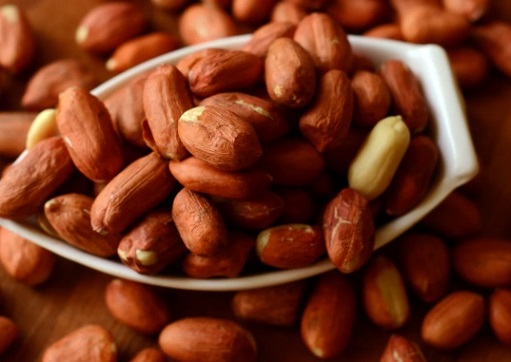Spanish Study Finds That Eating Peanuts Slows Aging in Youth by Protecting DNA Telomeres!
Nikhil Prasad Fact checked by:Thailand Medical News Team Apr 15, 2025 6 days, 21 hours, 55 minutes ago
Health News: A surprising new clinical trial from Spain shows that eating whole peanuts daily might actually help slow the aging process—at least at the cellular level.
Researchers from the University of Barcelona, the Maria de Maeztu Unit of Excellence at INSA-UB, the Instituto de Salud Carlos III in Madrid, and other Spanish research centers have discovered that consuming roasted peanuts with skins may help preserve telomere length—a key marker of biological aging—in young, healthy adults. Telomeres are tiny protective caps found at the end of chromosomes. As people age, these telomeres gradually shorten, and when they get too short, cells stop functioning properly and may die, contributing to aging and disease.
 Spanish Study Finds That Eating Peanuts Slows Aging in Youth by Protecting DNA Telomeres!
Spanish Study Finds That Eating Peanuts Slows Aging in Youth by Protecting DNA Telomeres!
In this
Thailand Health News report, findings from the randomized ARISTOTLE clinical trial suggest that skin-roasted peanuts may offer a surprising benefit by helping to slow the shortening of these telomeres.
What the Study Looked At
The study involved 58 healthy young men and women aged 18 to 33 who were divided into three groups for six months. One group consumed 25 grams of roasted peanuts with skins each day, another group took 32 grams of peanut butter, and a third group consumed a "control butter" made with peanut oil but without any of the beneficial plant compounds or fiber found in whole peanuts.
All participants had previously avoided peanuts for two weeks and were asked to keep their diets and exercise routines otherwise unchanged during the study.
The researchers measured participants’ telomere lengths using saliva samples taken before and after the six-month trial. They used a highly precise technique called quantitative real-time PCR to measure the relative length of telomeres.
Whole Peanuts Versus Peanut Butter
At the end of the six-month study, those who consumed roasted peanuts showed a significant increase in telomere length compared to those who consumed the control butter. The difference in telomere length between the roasted peanut group and the control group was statistically significant (mean difference of 0.53, p = 0.048). Meanwhile, no significant difference was observed between the peanut butter group and the control butter group.
The study also found that none of the participants in the roasted peanut group experienced accelerated telomere shortening, while 22% of peanut butter consumers and 38% of control butter consumers did.
The Role of Nutrients in Peanuts
Why did the whole roasted peanuts work better? The researchers suspect it has to do with how the peanuts were processed. Roasted peanuts contain their skins, which are rich in plant compounds called polyphenols, including coumaric acid and resveratrol, both of which have strong antioxidant and anti-inflammatory properties. These antioxidants help protect cells from damage
caused by free radicals—unstable molecules that speed up aging.
Interestingly, those in the roasted peanut group also had higher levels of fiber, vitamin E, and a specific polyphenol called m-coumaric acid in their diets. This particular compound was strongly linked to better telomere preservation. Additionally, increased intake of healthy fats called monounsaturated fatty acids (MUFAs), also found in peanuts, was positively associated with longer telomeres.
Peanut Butter May Not Be as Protective
Although the peanut butter used in the study was free of additives and only contained peanuts and salt, its processing method—grinding and homogenizing—may have altered the peanut’s natural structure. This could change how nutrients are absorbed and how they interact with gut bacteria, potentially lowering the health benefits seen with whole roasted peanuts. Researchers also noted that the production of short-chain fatty acids (SCFAs), which benefit gut and mental health, was higher in the roasted peanut group.
Other Health Improvements Noted
The study observed other benefits from consuming whole peanuts. Participants in the roasted peanut group saw a boost in HDL cholesterol (the “good” cholesterol) and improvements in their waist-to-hip ratios. These changes suggest that peanut consumption might help improve heart health and support a healthy body shape, both of which are associated with longer lifespan and reduced disease risk.
Limitations and What Comes Next
The researchers emphasized that while the results are promising, the study was limited by a small sample size and the homogeneity of the participants, who were all young and healthy. Future studies should examine older individuals or those with health conditions to see if similar benefits occur.
Despite the limitations, this study highlights the potential of peanuts as a simple dietary tool to support cellular health and prevent early aging. The research team suggests that further investigation into how specific nutrients and bioactive compounds in peanuts affect telomere length will be crucial.
Conclusion
This study presents exciting new evidence that regularly eating roasted peanuts with skins may help young people preserve their telomeres—key indicators of aging—and potentially delay the onset of age-related diseases. The benefits appear to be tied to natural antioxidants, healthy fats, and fiber found in whole peanuts, which are largely absent in more processed peanut butter. Although more studies are needed to confirm these findings in older or less healthy populations, the message is clear—snacking on whole peanuts could be a tasty and simple way to support long-term health at the cellular level.
The study findings were published in the peer reviewed journal: Antioxidants.
https://www.mdpi.com/2076-3921/14/4/467
For the latest
Health News, keep on logging to Thailand
Medical News.
Read Also:
https://www.thailandmedical.news/news/quercitrin-from-green-ball-apples-and-its-protective-role-against-skin-aging
https://www.thailandmedical.news/news/research-from-taiwan-shows-that-a-lychee-based-phytochemical-could-help-with-age-related-muscle-loss
https://www.thailandmedical.news/news/the-phytochemical-27-hydroxymangiferolic-acid-from-mangoes-can-extend-lifespan-and-improve-brain-health
https://www.thailandmedical.news/articles/anti-aging
https://www.thailandmedical.news/pages/thailand_doctors_listings
